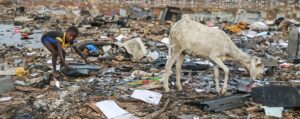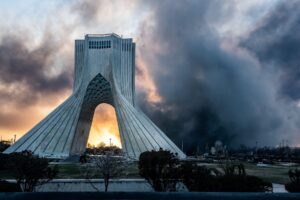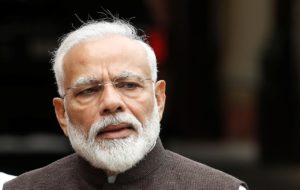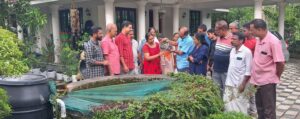‘What Would Our Cattle Say On Human Rights?’
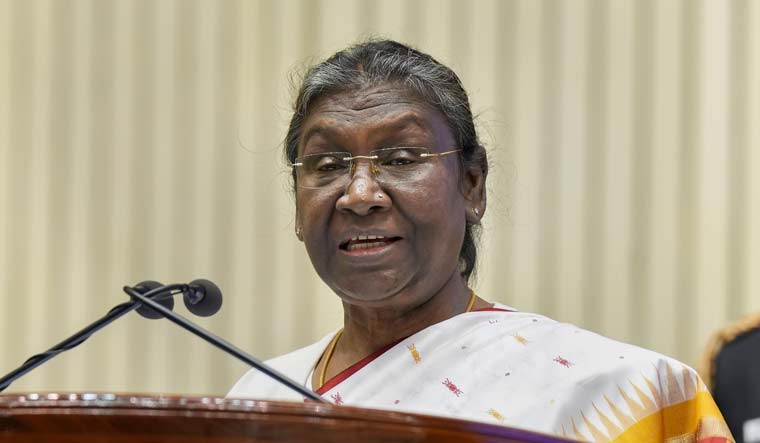
In her address at an event hosted in Delhi by the National Human Rights Commission to mark Human Rights Day, President Droupadi Murmu made a fervent appeal that humans must learn to treat nature and biodiversity with dignity and respect (Photo: PTI)
(Source: PTI)
Climate change is knocking on our doors and people in poorer nations are going to pay a “heavier price” for the degradation of the environment, President Droupadi Murmu said on Saturday and asserted that society must now consider the environmental dimension of justice.
In her address at an event hosted in Delhi by the National Human Rights Commission (NHRC) to mark Human Rights Day, she also made a fervent appeal that humans must learn to treat nature and biodiversity with dignity and respect.
“I wonder what would the animals and trees around us tell us if they could speak. What would our rivers say about human history and what would our cattle say on the topic of human rights. We have trampled on their rights for long and now the results are before us,” she said.
Just as the concept of human rights exhorts society to consider every human being as no different, “we should treat the whole living world and its habitat with respect”, the President said, adding, “We must learn, rather relearn to treat nature with dignity. This is not only a moral duty; let us remember it is necessary for our own survival too.”
Human Rights Day is observed to commemorate the Universal Declaration of Human Rights (UDHR). It was approved and proclaimed by the United Nations General Assembly on December 10, 1948, as a universally accepted value-based document of understanding the importance of the promotion and protection of human rights.
The theme of this year’s Human Rights Day is ‘Dignity, Freedom, and Justice for All’. This is close to the ideals expressed in the Preamble of India’s Constitution, Murmu said.
“I have said before that we should strive to expand the notion of justice. Over the past few years, the world has suffered from a high number of natural disasters caused by unusual weather patterns. Climate change is knocking on the doors. People in poorer nations are going to pay a heavier price for the degradation of our environment. We must consider the environmental dimension of justice now,” she said.
The President asserted that the challenge of climate change is so enormous that “it forces us to redefine ‘rights'”.
“Five years ago, the High Court of Uttarakhand held that the Ganga and Yamuna rivers have the same legal rights as human beings. But why stop at only two rivers? India is a land of sacred geography with countless holy lakes, rivers and mountains. To these landscapes, the flora and fauna add rich biodiversity,” she said.
Murmu also said that in olden times, Indian sages saw them all as part of “a universal whole, along with us”.
NHRC chairperson justice Arun Kumar Mishra (retd) in his address earlier said, “To protect our right to life, we have to perform the duty to protect the environment and prevent climate change. We cannot keep cutting trees and claim the right to live in a healthy environment.”
“Respect for nature, flora and fauna, biodiversity, environment and ecology is our fundamental duty incorporated under Article 51 A of the Constitution. It is well reflected in our culture and philosophy. We find the principle of sustainable development goals deeply embedded in Vedic culture,” the NHRC chief said.
Murmu, in her address, also emphasised that developing “sensitivity and sympathy” is key to promoting human rights.
The adoption of the UDHR was a landmark event in world history. Today, there is a high degree of awareness about the concept of human rights. But nearly 75 years ago, the world was a bit different. A large number of human beings were treated as less than equal, she said.
“Today, we fail to understand why something as simple as basic dignity could be denied to someone solely on the basis of their race, religion, gender or language, or where and in which group they were born,” the President said.
Murmu also recalled the contribution of Hansaben Mehta, who was India’s representative to the UN Human Rights Commission in drafting the declaration. “When the very first line was drafted as ‘All men are born free and equal’, it was Hansaben who suggested changing it to ‘All human beings are born free and equal’. A minor correction, with major implications,” she added.

